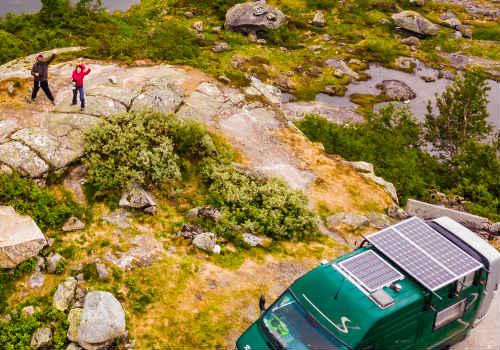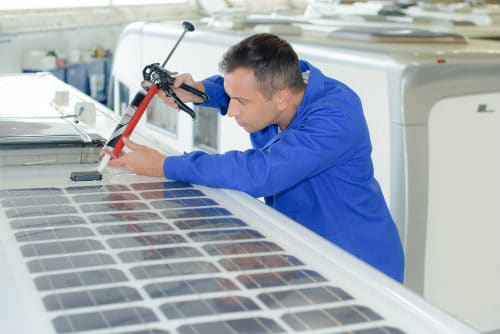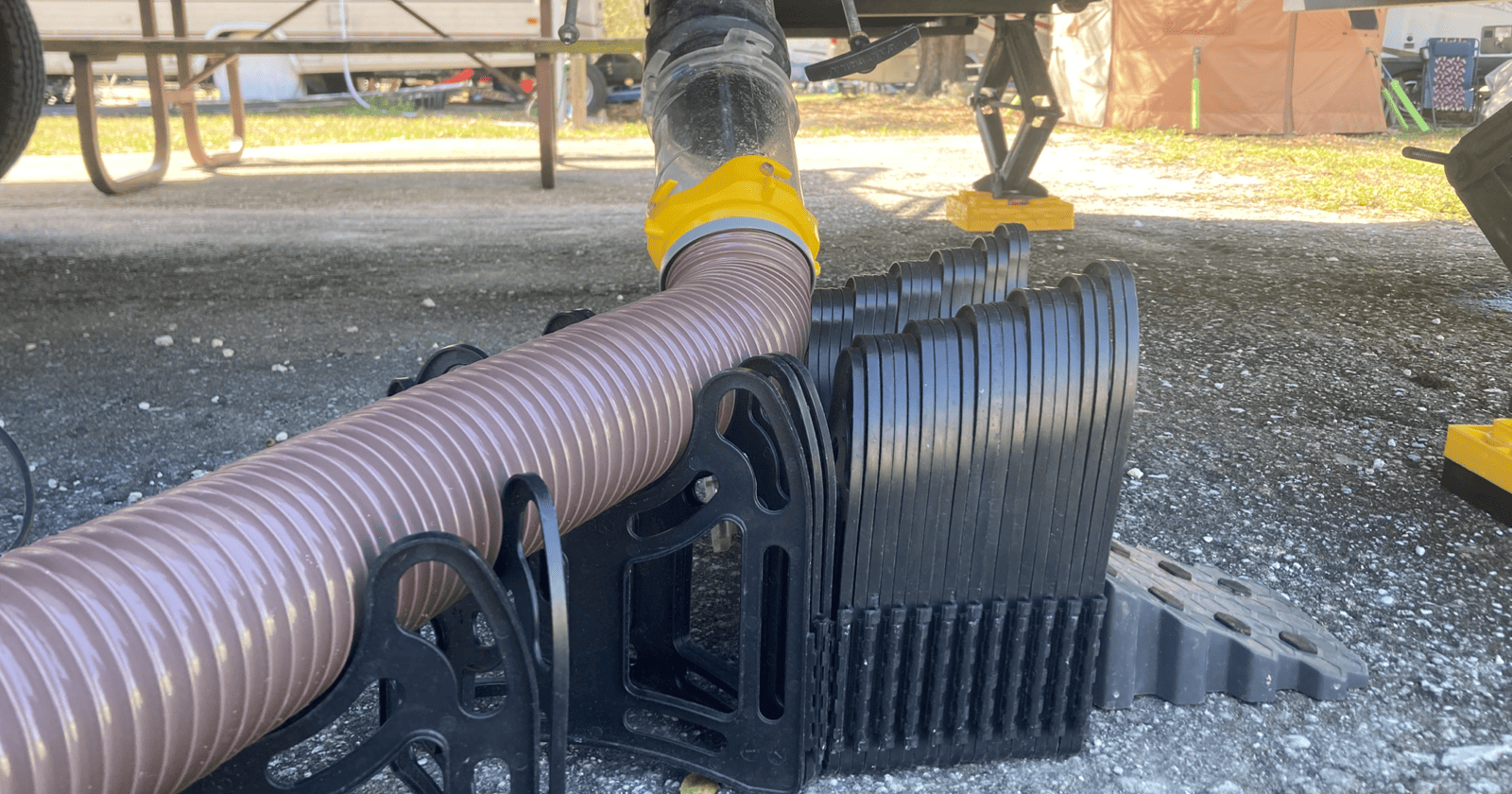Do you worry about getting stuck in the middle of nowhere, with no electricity to power up your devices when you need it? Having enough energy to power your RV is a must if you’re going off-grid, living green, or planning to go under the radar. Your battery won’t always be charged, and you won’t always have a convenient connection to a city line. Fortunately, there’s a solution to your RV energy needs. Installing RV solar panels will help you extend the life of your battery-powered gadgets, save money on utilities, and cut down on generator dependence. You’ll have the independence to go anywhere you want.
RV Solar Panels for Cleaner Energy
What are RV solar panels? Solar panel technology, or photovoltaics (PV), was developed to create an energy source that’s reliable, easy to use, and cheap to maintain. Solar technology, which is renewable and clean, was the answer. It’s been used in high-rise buildings and green homes. Solar panels also power satellites and airplanes. Now it’s a popular option for environmentally-friendly RVs as well.
RV solar panels are designed to convert irradiation from sunlight into power in the form of electricity. They can be arranged to lay flat or to flip up for more exposure to solar irradiation. Solar panels transform the energy and create an electric current, which is fed through the battery. They don’t need power appliances directly. Finally, the DC power is converted into AC power, which can be used to charge laptops, kitchen appliances, and your everyday RV tech.
8 Benefits of RV Solar Panels
Looking at how solar panels work and what they’re used for, it’s easy to see how they can be a huge game-changer for your RV experience. There are plenty of ways to power your RV, but you might still be wondering what the best way to power your RV is.
With solar panel technology, you’ll have access to the right amount of energy to charge your batteries and power your appliances.
#1 – Travel to Remote and Natural Places Confidently

Exploring the backcountry and sharing the camping experience with others are two of the reasons why more millennials are camping. However, plans to hike, camp, or explore in remote locations can be dashed by the fear of total disconnection. The fear of losing power for your RV and your gadgets can prevent you from exploring amazing and breathtaking views.
Even if you go to popular or nearby campsites, there’s no assurance that you’ll get a hook-up to power. You’ll be competing with RVs in need. Plus, there are some national parks and state parks that do not allow generators as part of their environmental and noise pollution management.
With solar panels, you can go anywhere where the sun shines –literally. You have the freedom to enjoy outdoor living in different places, from the mountains to the beach. This electrical independence means you don’t have to rush the search for shore power or generator repair. As long as there’s solar irradiation to convert into electrical current, you’ll have enough energy to keep going.
#2 – Safe and Reliable Energy
Reliability is at the top of the main features of any solar panel system. Unlike other electrical systems which depend on constant repair or connection with another external source, solar panel systems are designed to work on its own independently for a long time.
For the average user, a solar power system will last for 10 years or more. That’s the reason why most RV solar panel manufacturers offer their systems with a 25-year warranty –it’s meant to last you decades. For serious RV users, and for people who look at campers as a second home, this is an excellent investment. It quickly becomes worth the price down the road.
There’s a low chance of electrocution or electrical fire from RVs. RVs usually operate on less than 30 amps and 12 bolts. As long as the proper wire sizes and fuses are installed, you can be confident about the safety of the system.
#3 – Save Money with Cost-Effective Energy
Running an RV isn’t cheap. You spend more money every time you start up on the generator and every time you have to replace your battery.
Solar power technology is the ultimate cost-effective energy form. The initial set-up is definitely more expensive than traditional energy sources, running from $700 upwards, but even your traditional gas-powered generator has its own installment costs. Besides, with improvements in technology and a growing RV solar panel market, the price of buying panels and installing them is becoming cheaper by the minute.
The key is to buying and installing a system that fits your RV. Solar panel systems don’t come in a one-size-fits-all configuration. You need to install a system that matches your energy needs. This way, you won’t have to deal with power excess or deficits.
There are also practically no recurring costs in maintaining and using solar panels. Plus, you can save your money from tourist park fees for powered sites. The fees for hook-ups will probably keep rising as electricity prices soar, so having another option is definitely more cost-effective.
Ultimately, your wallet and savings account will thank you after installation. Sunlight is constant, renewable, and, more importantly, free.
#4 – Efficiently Charge Your Batteries

Solar technology can efficiently power your batteries. Instead of providing high-input charge to your battery, the slow and steady charge from solar panels will maximize the life of your RV batteries.
How does it work? Solar panels generate pure DC electricity before it’s inverted into AC power to charge your gadgets. DC electricity is the form that best suits your RV batteries, as it prevents repetitive deep discharges which damage and reduce the lifespan of batteries.
RV lead-acid batteries have quick system charges which naturally reduce their lifespan. Replacing them is expensive, but you have to do them every two to three years. This slower and more efficient charging through solar technology means a steady saturation of the electrons. Instead of quick charging and faster wear and tear, the batteries get to last longer. You can expect up to a 75% increase in battery life, so your battery can keep going up to 6 or more years depending on your use.
#5 – Clean and Green Energy
For RV users and campers who are invested in the environment, solar panel technology is the best option among all energy sources in the market. Solar panels don’t consume any fuel, and the system is designed to give off no waste. The highly efficient system means nothing gets wasted. You will be contributing directly to the reduction of fossil fuel power usage.
While generators do have emissions guidelines, which have been more and more strict in recent years, they still do damage on the earth. One of the biggest concerns is carbon monoxide poisoning from generator exhaust. A malfunction or under-regulated generator can do a lot of harm.
Another added bonus with solar panel technology is that you won’t see or smell any unsightly exhaust fumes.
#6 – Quiet and Peaceful Energy Conversion
Aside from the clean and green aspect, this type of energy system is also incredibly quiet. For many campers, the biggest appeal of living outdoors is the experience with nature. Imagine staying at your campsite, listening to the sounds of songbirds and rushing water. Then imagine the sounds of nature interrupted by the loud hum of the generator.
The growl of a generator can disconnect you from the experience. The revving of a small engine is a big reminder of the trappings of urban living. An RV that’s powered solely by a generator will hum every time you fire it up to cook, clean and even turn on the lights.
Because a solar panel system is composed of panels and wires with no moving parts, you won’t hear any mechanical noise disturbing your peaceful night under the stars. You also won’t be disturbing other campers in the same site.
It’s definitely the quietest means to supply power to your RV.
#7 – Inexhaustible Power Source All Year Round
One of the fears of people about solar panels is energy during winter months. Can the cloudy skies be enough to power your heater?
The truth is that solar technology runs well no matter what time of the year it is. Solar irradiation can break through and power your panels even during cloudy days, though there may be differences due to the input. Unless you’re planning to go to edges of the planet where there’s literally no daylight, then solar panels would still be a good investment.
#8 – Easy Maintenance and Clean up
Electrical and power systems can be a headache to deal with. Thankfully, installing solar panels won’t add to the problem. Though you might think that advanced technology requires more know-how and experience to handle, it’s actually the complete opposite.
There are no additional moving parts that can break when cleaning or adjusting. You don’t have to add fuel or change the oil. You also don’t have to worry about air, oil or fuel filters.
While even a light layer of dust or debris can lower the power output of solar panels, you won’t have to worry about it because keeping the RV panels clean is easy. It’s a matter of wiping down the panel surface to maximize the amount of sunlight coming into the system.
At most, you’ll only have to worry about maintaining your batteries. If you’re working with gel, AGM or lithium, maintenance is as easy as regular visual inspection.
Solar technology systems are also designed to last for literal decades, mainly because they’re part of a green energy movement.
FAQ About RV Solar Panel Benefits
Most people take their time about switching up to solar panels for their energy needs. After all, it’s still a pretty uncommon technology for homeowners and RV owners. To help you decide, here are some of the frequently asked questions about RV solar panels.
#1 – What Are the Types of Solar Panels Used in RVs?
There are three different types of solar panels in the market for RV use: mono-crystalline, poly-crystalline, and amorphous solar panels.
Mono-crystalline solar panels are constructed from a single crystal. The individual solar cells are a thin wafer of silicon crystal. They are highly efficient. If you’re planning to go to places which are generally cloudy or lowlight, mono-crystalline solar panels may be better for you.
On the other hand, poly-crystalline solar panels are made from several smaller crystals. They are the most popular type of solar panels, even though they produce slightly less power. They are more compact.
Lastly, amorphous solar panels have cells made from a thin layer of silicon attached to a backing material. Amorphous solar panels are the cheapest in the market with a high-efficiency rate.
Aside from the type of material, solar panels also come in two different types depending on their flexibility. There are flexible RV solar panels, which are lightweight and can be installed directly onto your roof. However, these panels can develop microscopic cracks under pressure.
Rigid RV solar panels have been in the market for a much longer time. They’re more durable compared to flexible RV solar panels, and they can hold against harsh travel conditions. However, they do weigh more, and they’re not as streamlined to look at.
#2 – How Many Solar Panels Do You Need for Your RV?
Installing a solar panel system for your RV consists of adding panels of various sizes, the charge controller, battery monitor, inverter for DC to AV power conversion, and wire harness.
The number of solar panels you need depends on your energy needs. You also have to think about the space available on the roof of your camper. Solar panels come in different watt levels so you can get one 120-watt panel or two 60-watt panels if you need a 120-watt energy output.
#3 – Do I Need to Glue the Solar Panels onto My Roof?
Flexible solar panels need to be glued onto your RV roof, while rigid solar panels also need to be installed directly. Many RV owners are worried about possible damage to the roof in the long run if ever they decide to replace or revamp the solar panel system.
If you don’t want to install your RV solar panel system directly onto your roof, you can try portable solar kits that can move around and even chase after the most sunlight possible. This option is ideal for smaller campers and RVs who don’t want the permanent added weight of solar panels.
#4 – What Do I Do with My Old Generator?
In all honesty, the solar panel debate doesn’t mean you have to throw your generator off the window. If you still have a well-maintained generator, you can install solar panels to your existing system to gain the benefit of higher efficiency and lower cost. Smaller solar panels might not support some high-powered appliances like the RV air conditioner, so you can still get a lot of use from your existing generators.
#5 – Can I Power My RV with Only Solar Power?
Certainly, yes. However, it depends on how much solar irradiation input you can get and how much power you consume each day.
The solar energy input during the peak of summer can be double or triple than that of winter, so you have to consider that. Heavy equipment like your air conditioner might not run purely on solar-powered batteries as well.
Final Thoughts
Going green through solar panels for your RV seems like a no-brainer. It’s efficient, clean, quiet, and easy to maintain. The only immediate downside is the high price tag that comes along the switch. Other than that, the benefits of having a solar panel outweigh the negative.
You don’t have to remove your generator or existing setup entirely, especially if you’re already comfortable with the hum of the engine and the smell of exhaust. Solar panels can be an excellent complement to your existing power source. You can use the generator to power up your air conditioner if you need it, while your solar-powered batteries can handle the rest of your electrical equipment. I know several people who first invested in portable solar panels or a few panels to start with.
The endpoint is that having access to unlimited, reliable, and clean energy wherever you are is a good idea, especially if we’re talking about years and even decades of camping. For people who treat the outdoors as a second home, the freedom from hook-ups and frequent battery changes are worth the switch to solar technology. No matter how you look at it, your RV experience is improved since you can confidently charge your electrical equipment as long as the sun is out.
If you’re the type of RV user who wants to relax and enjoy nature as much as possible, installing solar panels is the best option for you. It solves the problem of inefficient energy in remote locations and the guilt of adding more harm and poisonous exhaust to the environment. It also saves your wallet from the cost of frequent maintenance and replacements.
What are your thoughts on solar panels on your RV? I’d love to hear about them! Will you get a portable solar panel, a tilt-type system, or a flat-lay panel? Would you go for a rigid or flexible type?




